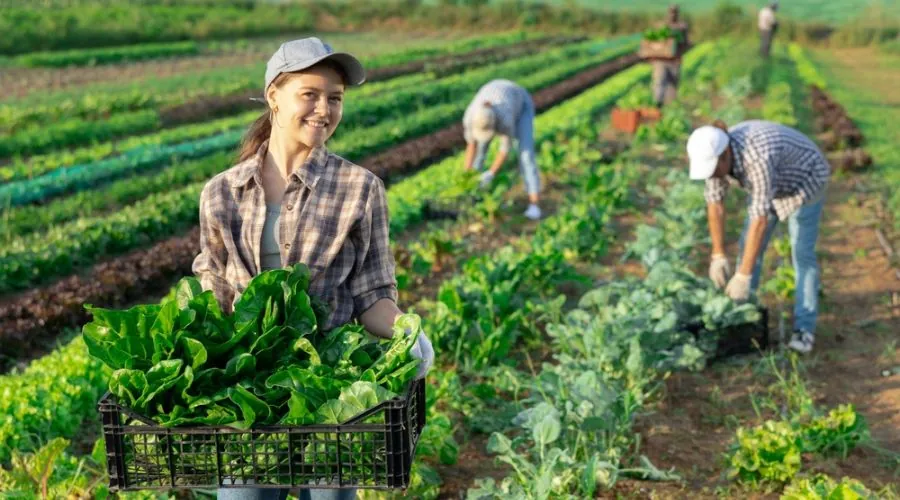Farm Worker Jobs in Italy: Italy, known for its rich agricultural heritage, offers a variety of farm worker jobs ranging from fruit picking to livestock care. The country’s diverse climate and terrain support a wide range of agricultural activities, making it an attractive destination for seasonal workers and those seeking employment in agriculture. This article provides a detailed guide to farm worker jobs in Italy, including job roles, salary expectations, and necessary qualifications.
Types of Farm Worker Jobs
- Fruit and Vegetable Picking:
- Italy’s regions such as Emilia-Romagna, Tuscany, and Sicily are famous for their fruits and vegetables. Seasonal jobs often involve picking apples, grapes, olives, tomatoes, and oranges.
- Job Responsibilities: Harvesting fruits and vegetables, sorting and packing produce, maintaining farm equipment, and ensuring proper storage.
- Vineyard Work:
- Italy is a leading wine producer, and vineyards require a lot of manual labor, especially during the harvest season.
- Job Responsibilities: Pruning vines, picking grapes, operating machinery for wine production, and maintaining the vineyard.
- Olive Harvesting:
- Olive farming is a major agricultural activity in regions like Puglia and Tuscany. Olive harvest typically occurs in autumn.
- Job Responsibilities: Picking olives by hand or using tools, sorting olives for quality, and assisting in olive oil production.
- Livestock Farming:
- Italy’s livestock farms raise cattle, sheep, and pigs, particularly in regions like Piedmont and Sardinia.
- Job Responsibilities: Feeding and caring for animals, cleaning stalls, milking cows, and assisting in breeding programs.
- Greenhouse Farming:
- Greenhouses in Italy grow flowers, herbs, and vegetables. This work requires more controlled environments and can be available year-round.
- Job Responsibilities: Planting seeds, watering plants, maintaining greenhouse conditions, and harvesting produce.
Salary Expectations for Farm Workers in Italy
The salary for farm workers in Italy varies depending on the type of work, region, and the worker’s experience. Seasonal work often pays by the hour or per kilogram of produce harvested.
| Job Role | Average Monthly Salary (EUR) | Average Hourly Wage (EUR) |
|---|---|---|
| Fruit and Vegetable Picker | 1,200 – 1,800 | 8 – 12 |
| Vineyard Worker | 1,300 – 1,900 | 9 – 13 |
| Olive Harvester | 1,200 – 1,800 | 8 – 12 |
| Livestock Farm Worker | 1,400 – 2,000 | 9 – 14 |
| Greenhouse Worker | 1,300 – 1,800 | 8 – 12 |
Note: Salaries can vary based on location, employer, and the worker’s experience level.
Working Conditions
Farm work in Italy can be physically demanding and may require long hours, especially during peak harvest seasons. Workers should be prepared for outdoor work in varying weather conditions. Employers typically provide basic amenities, such as housing, especially for seasonal workers coming from abroad.
Qualifications and Requirements
- Experience: While not always required, previous experience in agriculture can be beneficial.
- Physical Fitness: Farm work is labor-intensive, requiring good physical health and stamina.
- Work Permits: Non-EU citizens will need a work visa to be employed legally in Italy. The Italian government issues permits for seasonal work in agriculture under specific conditions.
- Language Skills: Basic Italian can be helpful, though not always necessary. Some farms employ international workers and may have multilingual supervisors.
How to Find Farm Worker Jobs in Italy
- Online Job Portals: Websites like EURES (European Job Mobility Portal), Indeed, and Jobrapido often list farm worker jobs in Italy.
- Recruitment Agencies: Several agencies specialize in recruiting seasonal agricultural workers. Research and verify their credibility before applying.
- Local Farm Cooperatives: In Italy, many farms are part of cooperatives that may hire workers directly or provide information on job openings.
- Direct Applications: Some farms accept direct applications. Contacting them via email or phone can sometimes lead to job offers.
Benefits of Working as a Farm Worker in Italy
- Cultural Experience: Working in Italy provides a chance to experience the local culture, cuisine, and way of life.
- Learning Opportunities: Farm work can teach valuable skills in agriculture, language, and cross-cultural communication.
- Networking: Meeting other workers from around the world can expand personal and professional networks.
Conclusion
Farm worker jobs in Italy offer unique opportunities for those interested in agriculture and experiencing Italian culture. While the work can be physically demanding, the benefits of working in one of the world’s most beautiful countries can be rewarding. Understanding the job roles, salary expectations, and application processes can help prospective workers make informed decisions about pursuing farm work in Italy.
